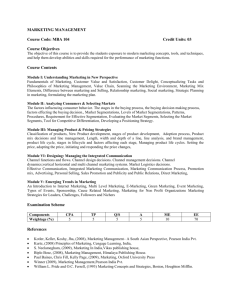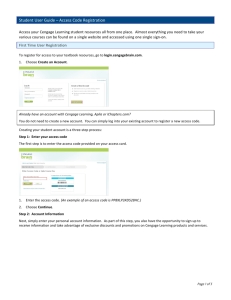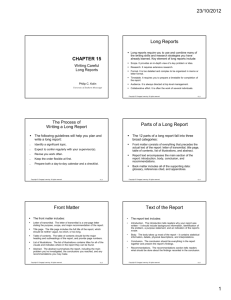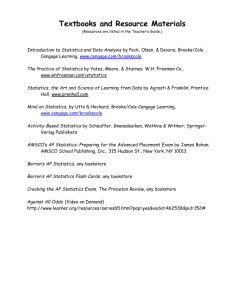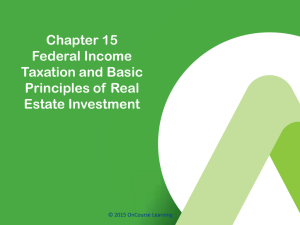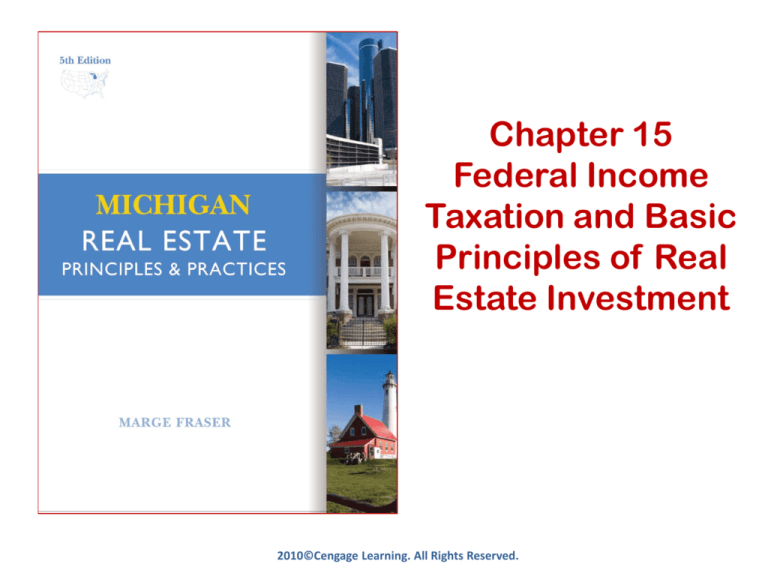
Chapter 15
Federal Income
Taxation and Basic
Principles of Real
Estate Investment
2010©Cengage Learning. All Rights Reserved.
IN THIS CHAPTER
• Real estate licensees should recommend
that buyers and sellers seek this specialized
expertise.
• The fundamentals of tax implications in the
ownership and sale of a principal residence
and business and investment property.
• Special tax benefits provided to owners and
sellers.
• Basic real estate investment principles
2010©Cengage Learning. All Rights Reserved.
Depreciation
• Deductible allowance from net income of
property when arriving at taxable income.
• Useful life for residential property is 27.5
years and 31.5 years for nonresidential
property.
• No depreciation allowed for land.
2010©Cengage Learning. All Rights Reserved.
Passive Income
• Any tax losses from investment property
are allowable only to offset income from
passive activities.
• Taxpayers may shelter up to $25,000 of
passive income or active income with
adjusted gross income of less than
$100,000 who actively manage their own
rental property.
2010©Cengage Learning. All Rights Reserved.
INTEREST AND TAXES
The tax-deductible expenses of home
ownership are
– mortgage interest
– ad valorem real property taxes
2010©Cengage Learning. All Rights Reserved.
2010©Cengage Learning. All Rights Reserved.
2010©Cengage Learning. All Rights Reserved.
2010©Cengage Learning. All Rights Reserved.
Sales of Principal Residences
• Married homeowners may exclude from
taxation up to $500,000 of the gain
from the sale of a principal residence.
• Single homeowners are allowed to
exclude up to $250,000.
• the taxpayer must have owned and
occupied the home as a principal
residence for at least two of the last five
years.
2010©Cengage Learning. All Rights Reserved.
Capital Gains
• A gain or loss on the sale of an asset is not
recognized for income tax purposes until
you dispose of the asset.
• When gain becomes taxable it may be
eligible for the preferential capital gains tax
rates depending upon the length of
ownership.
• Professionals should be consulted to
determine the exact date and rate for any
transaction.
2010©Cengage Learning. All Rights Reserved.
Estate and Gift Taxation
• A gift tax is imposed on lifetime transfers
by gift.
• An estate tax is imposed on transfers at
death.
2010©Cengage Learning. All Rights Reserved.
Like-Kind (Section 1031) Exchanges
•
•
•
•
The properties must be like-kind.
No boot received or taxable.
Basis of property are exchanged.
The property for exchange must be
identified in writing within 45 days.
• The closing on the property must be
within 180 days.
• No tax due at time of exchange – no sale.
2010©Cengage Learning. All Rights Reserved.
Self-Employed Persons
• Home Office Deductions
• Health Insurance Deductions
• Business Expenses
2010©Cengage Learning. All Rights Reserved.
REAL ESTATE INVESTMENT
•
•
•
•
•
Capital appreciation
Cash flow
Tax advantages
Tax deferral
Time value of money
– A dollar received today is more
valuable than a dollar received
next year.
2010©Cengage Learning. All Rights Reserved.
CHAPTER TERMINOLOGY REVIEW
Accelerated depreciation
basis
boot
capital gain
deferred gain rollover
depreciation
Involuntary conversion
like-kind property (Section 1031) exchanges
multiple exchange
opportunity cost
passive income
proration of the universal exclusion
realized gain
Starker exchange/Starker trust
straight-line depreciation
tax-deductible expenses
Taxpayer Relief Act of 1997
universal exclusion
unlike-kind property
2010©Cengage Learning. All Rights Reserved.

